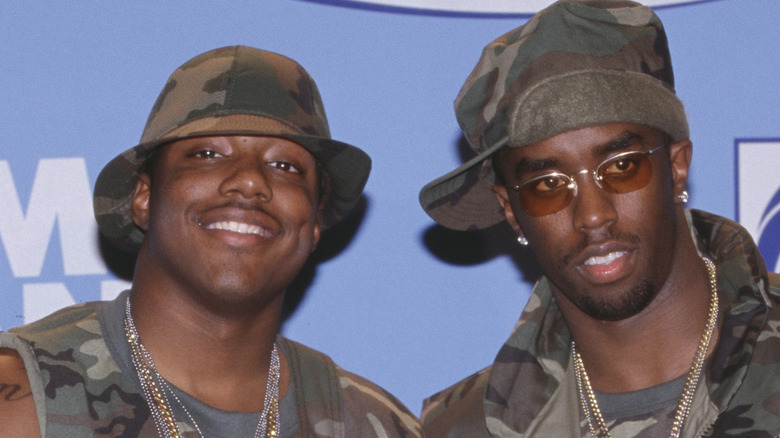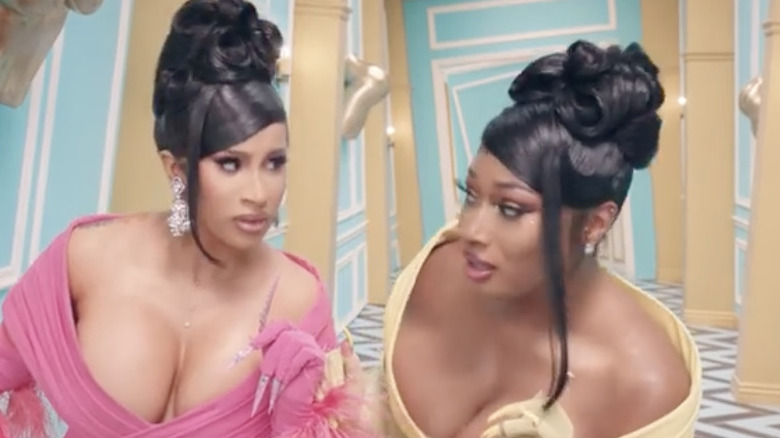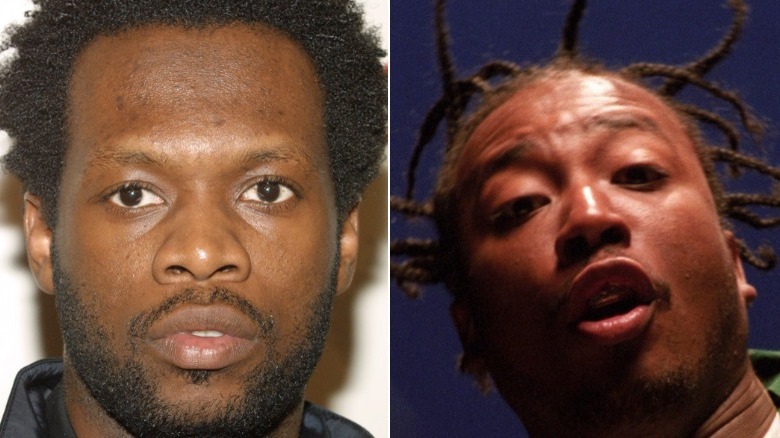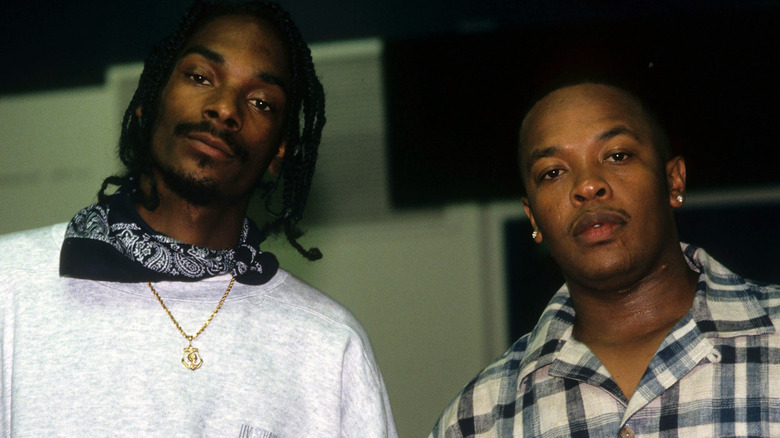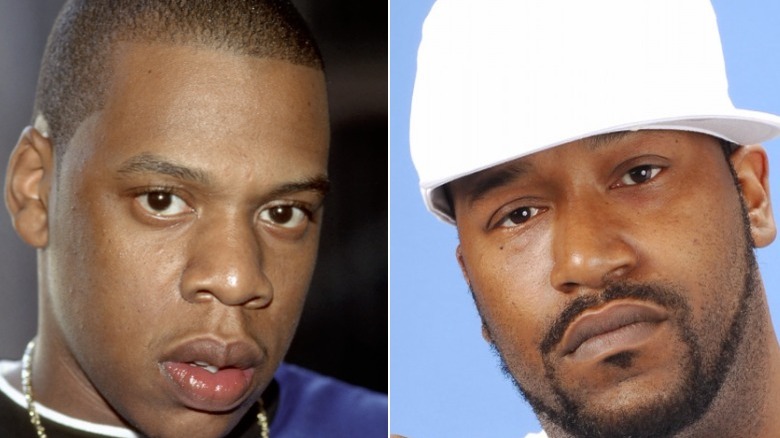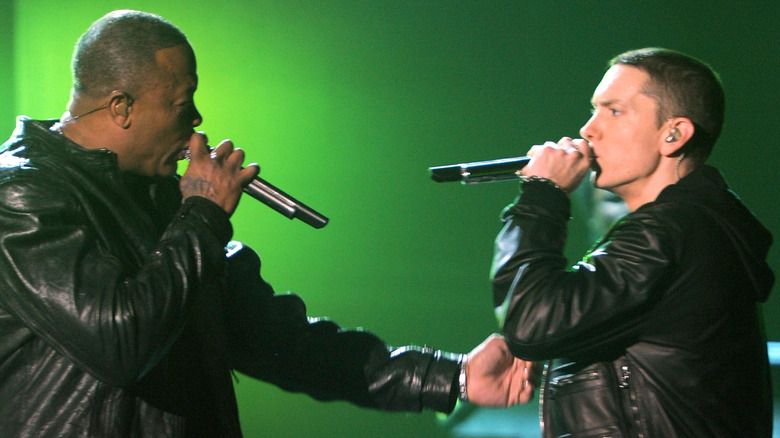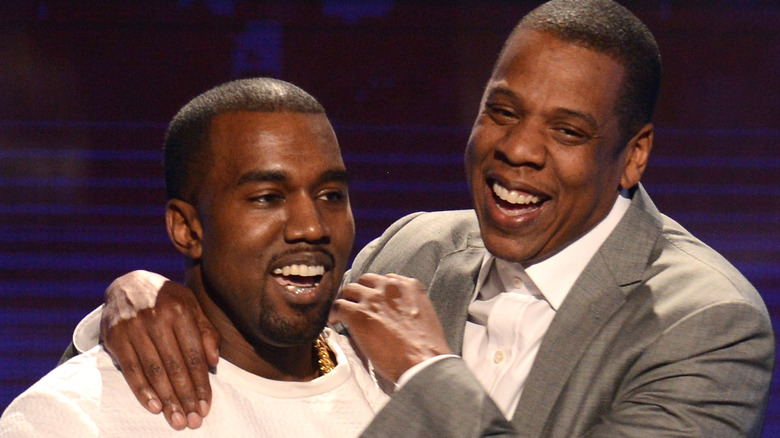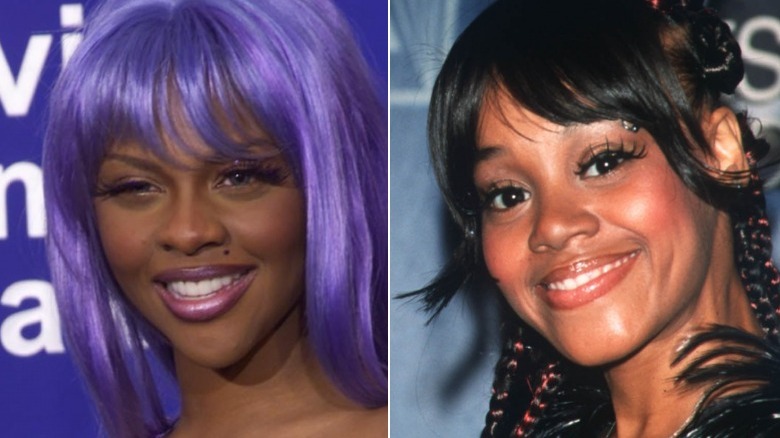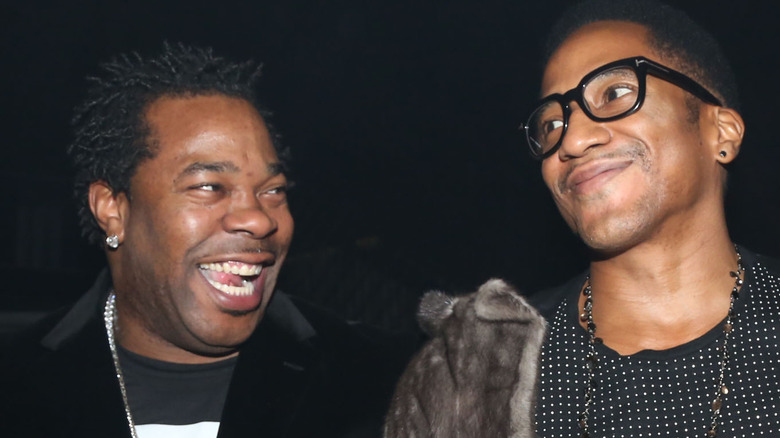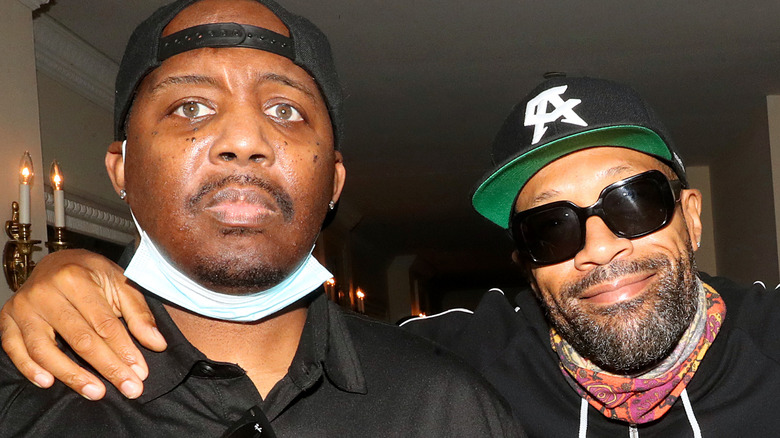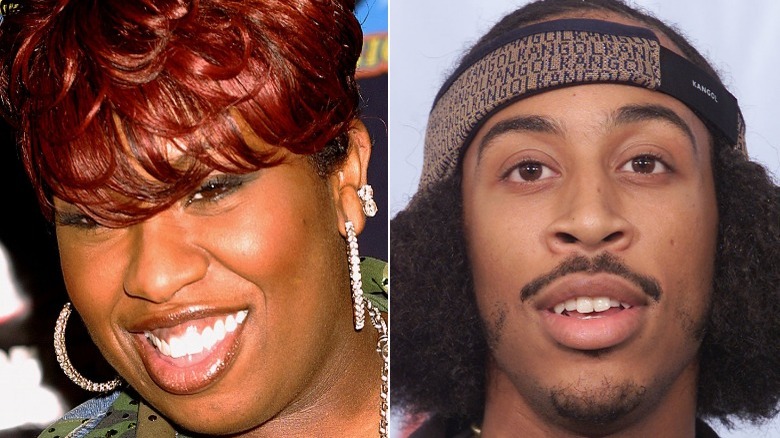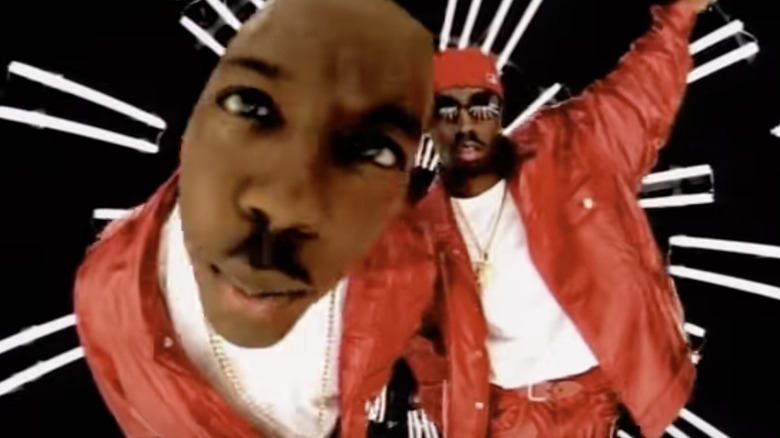The Best Rap Collaborations Of All Time
Long before Dr. Dre, Snoop Dogg, and Eminem performed together at the 2022 Super Bowl Halftime Show, and harkening back to its beginnings as improvised party music in the Bronx in the 1970s, as per History, hip hop has always revolved around the magic that comes from collaboration. Back then, an MC would speak rhythmically, or rap, as it came to be known, over records, beats, samples, or a portion of music played and manipulated by a DJ with turntables and a mixing board. Hip hop has evolved tremendously in the last 40-odd years, but it's still about generating great music out of organic meetings of minds — producers bring in beats, rappers rap over them, and to get a different or extra vibe on the track, they'll bring in another performer to contribute a verse, serve as a hype man, or give it their coveted blessing in the form of a duet.
Some of the biggest hits and most notable hip hop moments have been joint ventures between two artists best known for doing their own thing, apart from one another. Here then are some of the best rap collaborations of all time.
W.A.P. - Cardi B and Megan Thee Stallion
When she first started writing "W.A.P.," Cardi B conceived it as a duet between herself and Megan Thee Stallion but was initially hesitant to ask. "A lot of collabs that I haven't made yet — it's really because of my shyness," Cardi B told Tidal (via Insider). After getting her contact info — their wardrobe stylists knew each other — they hit it off. "We started having girly conversations — just funny stuff. A couple of days later, we start sending tracks to each other."
"W.A.P." is full of sexual connotation, with Cardi B and Megan Thee Stallion describing throughout their readiness, willingness, and eagerness to engage in all kinds of very specific pleasurable experiences. The song, which debuted at No. 1 on the Billboard Hot 100, was celebrated by millions for its frank, clever, and blatantly sexual content, and derided by just as many for exactly the same reasons, according to NME.
The song is full of memorable, beyond flirtatious lines barely shrouded in metaphor, like "I want you to park that big Mack truck right in this little garage," and how a man who performs a certain act on them will contract diabetes and be willing to pay for their college tuition, taking the humble out of humble-brag.
Ghetto Superstar (That Is What You Are) - Pras and Ol' Dirty Bastard
Internal creative tension may be what made the Fugees so great. After selling seven million copies of its breakthrough, acclaimed 1996 album "The Score" (per the Recording Industry Association of America), all three members of the trio — Wyclef Jean, Lauryn Hill, and Pras — launched successful solo careers. Among their respective, very well-received releases: "The Carnival," "The Miseducation of Lauryn Hill," and "Ghetto Superstar," one of the most notable and enduring singles of 1998, which has far outlasted its source material in terms of cultural relevance, the Warren Beatty political comedy "Bulworth" (via Rolling Stone).
While both the Fugees and the Wu-Tang were among the most prominent groups of the era, the collaboration between Pras and ODB came about by accident, if not by mistake. According to an interview with Vlad TV, Pras said that ODB wandered into the studio when he was recording "Ghetto Superstar" and thought he belonged there, even though Pras was in California and ODB's regular haunt was back in New York. "He thought my session was his session," Pras said. "He didn't know the state he was in."
After trying to "get him out in the nicest way," Pras recalled, ODB heard the backing track for "Ghetto Superstar" and liked it so much he begged to contribute a verse over it. Pras placated the rapper, who did his part in one take, planning to "erase this s*** when it's all said and done," he said, changing his mind when it "turned out hot!"
Nuthin' but a 'G' Thang - Dr. Dre and Snoop Dogg
In the early 1990s, Dr. Dre, always as much as a producer and sound creator as he was a rapper, per All Music, was slowly emerging from gangsta rap pioneers N.W.A. as a solo artist, eventually releasing the seminal 1992 album "The Chronic," which is absolutely loaded in features and turns the spotlight on rising artists of whom Dre gives his stamp of approval. The breakout star of "The Chronic" is undoubtedly Snoop Dogg, the Southern-drawling rapper whose laconic delivery on "Nothin' But a 'G' Thang" proved formative to '90s rap and beyond.
According to Biography, Snoop had been arrested a few times while still in high school, and as a way of avoiding prison and falling back in the Rollin' 20 Crips gang, he got into music, forming a trio called 213 with his cousin, singer Nate Dogg, and a friend, Warren G. The latter happened to be Dr. Dre's stepbrother, according to Rolling Stone. Warren G gave Dr. Dre a demo of Snoop rapping over En Vogue's "Hold On," and the former NWA producer vowed to work with the upstart as soon as possible. After featuring him on his 1992 single "Deep Cover," Dre brought Snoop in to rap on "Nuthin' But a 'G' Thang," which the two wrote with Dre's frequent collaborator The D.O.C., as per Vlad TV.
Big Pimpin' - Jay-Z and UGK
For his 1999 single "Big Pimpin,'" off of his album "Vol. 3 ... Life and Times of S. Carter," Jay-Z eschewed his preferred musical backing of soul, funk, R&B, and rock-inspired beats in favor of a North African/Middle-Eastern sensibility, sampling the 1960 piece "Khosara Khosara" by Egyptian composer Baligh Hamdy, per The Hollywood Reporter.
At the time of the song's release and subsequent popularity ("Big Pimpin'" hit No. 18 on the Billboard Hot 100 in 2000), Southern rap was enjoying a moment in hip hop, as acts like Juvenile, Ludacris, and Outkast found major success. Jay-Z tapped into that by inviting along on the "Big Pimpin'" trip one of the foundational groups of Southern rap: UGK, or Underground Kingz, a duo which formed in the '80s, consisting of Pimp C (the later Chad Butler) and Bun B (Bernard Freeman).
According to the Complex documentary "Long Live the Pimp" (via The Box Houston) Jay-Z was a UGK fan, and he personally called Bun B to ask him for a guest shot. He thought it was a prank call at first, until he realized the real Jay-Z was, in fact, on the line. Pimp C took more convincing. He'd refused to guest on an earlier Jay-Z track because he didn't want to leave Texas to record it. Begrudgingly, Pimp C agreed to do "Big Pimpin,'" even though he hated the flutes in the mix, labeling it a "trash can-a** beat."
Forgot About Dre - Dr. Dre and Eminem
In 1997, Eminem debuted his gleefully violent "Slim Shady" persona on the independently released "Slim Shady EP," according to Far Out. Not widely heard outside of Detroit, Eminem honed his skills at rap battles, and a tape of one found its way to an Interscope Records intern, per Rolling Stone. Executive Jimmy Iovine thought enough of it to hand it off to his business partner, Dr. Dre, who loved the recording so much he wanted Eminem to fly out to Los Angeles to record with him immediately. Dre signed Eminem and co-produced and co-wrote his major-label debut in 1999, "The Slim Shady LP." Eminem repaid all the favors to his mentor and champion on "Forgot About Dre," the first single from Dr. Dre's 2000 album, "2001."
Dre delivers a lyrically dense first verse, name-dropping long-ago collaborators Eazy-E, Ice Cube, and D.O.C., and taking credit for their successes and taking credit for giving the world "a tape full of dope beats to ump when you stroll through in your hood," and so forth. Once he's done, in comes the biggest new star in rap of the last two years, Eminem, to reiterate Dre's point on the chorus: "Nowadays everybody wanna talk like they got something to say, but nothing comes out when they move their lips," Eminem spits with superhuman quickness. But he's not just here for the hook, taking over the song that's ostensibly about Dre to tell a long Slim Shady about strangling a guy and burning a house down.
Run This Town - Jay-Z and Kanye West
For "Run This Town," the second single from his 2009 album "The Blueprint 3," Jay-Z recruited two collaborators as equally famous and influential: Rihanna and Kanye West. Rihanna belting out the ominous, wordless hook and singing the chorus makes "Run This Town" a defiant, inspiring anthem. But it's West, just after completing his school trilogy ("The College Dropout," "Late Registration," and "Graduation") who steals and elevates "Run This Town." Coming in on the third verse of a song he produced in his typical bombastic style, West's lyrics are self-conscious and defensive ("Next time I'm in church, please no photos"), playful ("I'm just tryin' to change the color on your mood ring"), and witty ("I can spend my whole life goodwill hunting"). It's a true collaboration because West takes the vibe Jay-Z sets up and runs with it.
"Run This Town" won two Grammy Awards — Best Rap Song and Best Rap/Sung Collaboration — and hit No. 2 on the Billboard Hot 100, making it one of the most quantitatively successful songs ever for Jay-Z, West, and Rihanna. And yet, Jay-Z nearly dropped it from "The Blueprint 3." "We had started on 'Run This Town' and he wasn't really catching a vibe," engineer Young Guru told the Red Bull Music Academy, explaining that the rapper wanted it "to feel like an army is marching down the street." Young Guru added in a "stomp sound" he'd previously used in a Memphis Bleek record, giving Jay the sound he'd wanted.
Not Tonight (Remix) - Lil' Kim, Da Brat, Left Eye, Missy Elliott, and Angie Martinez
In the late '90s, when there were few prominent female rappers, a lot of them gathered for a revamped version of "Not Tonight," the standout track on the soundtrack to the 1997 Martin Lawrence movie "Nothing to Lose." Initially credited primarily to "Lil' Kim," "Not Tonight" first appeared on the rapper's album, "Hard Core," and concerns a woman requesting particular bedroom acts from her male companion. The song wasn't a hit or even a single, but it was when co-producer Missy Elliott added a highly recognizable sample of Kool and the Gang's enduring party anthem "Ladies' Night" and also brought in rappers Da Brat, Lisa "Left Eye" Lopes from TLC, herself, and Angie Martinez (a radio personality making an early foray into music) to bolster Lil' Kim's verses.
Each of those huge names contributing lines and verses makes a statement about how there's a place for women in the traditionally male-dominated world of hip hop, a point hammered home by the video, which features non-rapping singers like Mary J. Blige and Xscape, as well as one of the first A-list female rappers, Queen Latifah. The collective later reunited to perform "Not Tonight" as a heavily produced, show-stopping, ancient Egyptian-themed number at the 1997 MTV Video Music Awards.
Scenario - A Tribe Called Quest and Leaders of the New School
A Tribe Called Quest helped bring something new to the rapidly evolving hip hop landscape in the late '80s. As progenitors of what would come to be called alternative hip hop, their lyrics were introspective and reflected what was going on in society and culture at the time, rapped over music that featured jazz instrumentation and samples. One of their best known songs, "Scenario," from the group's second album, 1991's "The Low End Theory," is credited to two New York-based collectives: A Tribe Called Quest and Leaders of the New School. Tribe was part of a broader hip hop movement of likeminded groups called Native Tongues. According to Rolling Stone, word got out in that community that Tribe wanted to record a well-populated "posse track," and a number of Native Tongues rappers recorded verses, including De La Soul's Posdnous, Black Sheep's Dres and Mista Lawnge, and departed Tribe member Jarobi. Only Leaders of the New School's Charlie Brown, Dinco D, and Busta Rhymes made it into the final max (via Genius).
A frenetic, party-starter, "Scenario" doesn't offer up featured verses the way latter rap classics would do, but rather alternates between members of the Tribe and the New School. Phife Dawg starts off with a then-current reference to Bo Jackson's "Bo knows...," and Busta Rhymes finishes it off with a star-making turn, going "rawr rawr, like a dungeon dragon."
Full Cooperationv- Def Squad
The Def Squad took the idea of the rock "supergroup" and applied it to hip hop. Before releasing the album "El Niño" in 1998, Erick Sermon (of EPMD), Redman (a solo act and well known for his musical and screen collaborations with Method Man), and Keith Murray released, under their own full names, a fun and faithful cover of the Sugarhill Gang's seminal "Rapper's Delight," the first rap song to reach the top 40 of the Billboard pop chart (per History) back in 1980. According to Complex, Sermon met Redman when the latter was DJing for Lords of the Underground at a club in New Jersey, and they soon teamed up for the 1990 EPMD song "Hardcore," planting the seeds of a collaboration that would later be formalized as the Def Squad.
Each musician brought something unique to the table, creating a mix of hard beats, hooks, poetry, and unabashed humor on the only official single from "El Niño," the rock-solid, "Full Cooperation," consisting mostly of an irresistibly catchy groove (built on Houston Person's "Pretty Please," according to WhoSampled) that suggests a '70s action movie score. The lyrics crackle and dazzle, but they get drowned out in the "Full Cooperation" video. As their styles are all different but serving the same end, each Def Squad member tackles a different Eddie Murphy movie in the clip, with Murray remaking scenes from "Another 48 Hours," Sermon utilizing "The Nutty Professor," and Redman doing "Trading Places."
Gossip Folks - Missy Elliott and Ludacris
"Gossip Folks," a single from Missy Elliott's 2002 LP "Under Construction," begins with its ominous, perpetually repeating, start-stop, four-note heavily processed synth riff, driving the song hard as Missy Elliott disarmingly squeals in a high pitched voice about some real problems she's been going through after becoming a public figure. Tabloids, individuals — they're all just gossip folks who won't let the great Missy be in peace to do her thing.
On the stripped-down, skeletal chorus, Elliott gets some help from a sample of the 1981 Frankie Smith funk standard "Double Dutch Bus" (per WhoSampled) and the cocky, swaggering vocals of early 2000s rap superstar Ludacris. His guest verse is a rapid-fire autobiographical origin story, which functions as a lesson in keeping confident under the weight of gossip folks, which remains vital two decades later despite references to the Arnold Schwarzenegger comedy "Kindergarten Cop" ("it's not a tumor") and "South Park" (a brief imitation of the character Timmy). After releasing his first two albums in two years, according to Stereogum, Ludacris guested on songs by whoever would have him, including Elliott, who featured him on her 2001 hit "One Minute Man." She brought him back for more on "Gossip Folks."
Mo Money Mo Problems - Notorious B.I.G., Puff Daddy, Ma$e
In 1997, Notorious B.I.G. dominated the Billboard Hot 100 singles chart but wasn't around to enjoy it, as he was shot and killed on March 9, 1997, per the Atlanta Journal Constitution. "Mo Money Mo Problems" went to No. 1 in late summer 1997 (via PBS), recorded for his posthumous, ominously titled album, "Life After Death." With a title that became a catchphrase that became a lament of rich people, a modern day proverb that explains how everyone has issues that negatively impact and complicate their lives, which can scale with income, "Mo Money Mo Problems" doesn't include Biggie until it's almost over. Producer Puff Daddy cedes the first verse to showcase his mumbly mouthed mentee, Ma$e.
According to AllMusic, Ma$e ingratiated himself to Puff Daddy after his group, Children of the Corn, fell apart after the death of a member. In 1996, Ma$e attended a music conference in Atlanta, specifically hoping to meet in-demand producer Jermaine Dupri. He met Puff Daddy instead, who signed him to his burgeoning company, Bad Boy Records, and then featured him on half a dozen singles by label-mates throughout 1996 and 1997, culminating in their collaboration on "Mo Money Mo Problems."
